 In today's world of
technologically advanced aviation, Army pilots alone cannot keep
AH-64D Apache Longbow helicopters operational without ground crews.
Sustaining the intricate workings of digital and complex avionics
requires proficient ground crews and technical personnel. Soldiers
of 1st Attack Reconnaissance Battalion, 1st Aviation Regiment,
known as the Gunfighters, work diligently around the clock
maintaining, testing and sustaining the Combat Aviation Brigade,
1st Infantry Division's battalion of Apache attack and
reconnaissance gunships in northern Iraq.
In today's world of
technologically advanced aviation, Army pilots alone cannot keep
AH-64D Apache Longbow helicopters operational without ground crews.
Sustaining the intricate workings of digital and complex avionics
requires proficient ground crews and technical personnel. Soldiers
of 1st Attack Reconnaissance Battalion, 1st Aviation Regiment,
known as the Gunfighters, work diligently around the clock
maintaining, testing and sustaining the Combat Aviation Brigade,
1st Infantry Division's battalion of Apache attack and
reconnaissance gunships in northern Iraq.
Preventive maintenance is a major facet of success for the
Apache ground crews, officials said.
"We do preventive maintenance services, which is a basic
teardown of the aircraft, checking for common things that are
broken," said Army Spc. Jedediah Cooke, an Apache crew chief with
the battalion's Company C. "In addition, we do 50-hour inspections
to check out the major flight controls."
Not all the work the ground crews perform on the Apaches is
routine or scheduled.
"If aircraft were to come back (from a combat sortie) with
possible flaws or a deficiency, it is our mission to ensure
maintenance is conducted and aircraft are repaired, put back in the
air and remain flyable at all times," said Sgt. 1st Class Antonio
Ruiz, maintenance platoon sergeant with Company C.
"As the platoon sergeant, I oversee maintenance on the flight
line. I have my crew (mechanic section) along with the armament
section that I utilize. When aircraft return broken in any way, I
go ahead and look at the aircraft, and take a look at the fault the
pilots give me," Ruiz said.
"I go ahead and hand it out or delegate the fault to the back
shops so they are repaired in a timely manner. There are a lot of
eyes looking at the aircraft. There is the soldier, the supervisor
and the technical inspector," Ruiz said.
"Everybody takes this job really serious because you want to do
the best you can; you don't want any birds going down, especially
out there during a mission," said Army Spc. Christopher Lara, an
Apache repair mechanic with Company C.
"We are supporting ground units in northern Iraq, providing
coverage from the air. It makes you feel good, (because) without
air support, the ground troops would not have that (added
protection)," Lara said.
Cooke said he also takes pride in his job. He knows if an Apache
takes off from the tarmac, it is heading out to support American,
Iraqi and coalition forces.

"I think I do help those guys out there kicking in doors. I have
been told by infantrymen that they love to see these aircraft fly
over. This is why we work as hard as we can," said Sgt. Chris
Martin, another Apache repair mechanic with Company C.
Pilots appreciate the hard work that goes into a stringent
aircraft maintenance program.

"These guys are working on $30 million aircraft. They keep track
of numerous moving pieces, working six days a week, sometimes even
working on their days off. It is very impressive to see what they
do on a daily basis," said Chief Warrant Officer Joseph Thompson, a
maintenance test pilot with Company C.
Teamwork and everybody knowing their job also contribute to the
complete aircrafts' safety and effectiveness.

"When aircraft land, they may have avionics or electrical
problems, and there are separate shops to deal with each; we also
work with production control," Martin said. "I trust armament, and
I trust my shops."
"Depending what the maintenance issue is, we are out there
working with the armament section. They know their job, and they
want us helping them, and we are out there getting them what they
need," Lara said. "Everybody knows their jobs. ... It all works
together, and it ensures we all know what it takes to keep the
birds flying."
 Airborne-Flight Training 05.09.24: ERAU at AIAA, LIFT Diamond Buy, Epic A&P
Airborne-Flight Training 05.09.24: ERAU at AIAA, LIFT Diamond Buy, Epic A&P ANN's Daily Aero-Term (05.07.24): Hazardous Weather Information
ANN's Daily Aero-Term (05.07.24): Hazardous Weather Information Aero-News: Quote of the Day (05.07.24)
Aero-News: Quote of the Day (05.07.24) NTSB Final Report: Cessna 150
NTSB Final Report: Cessna 150 Aero-News: Quote of the Day (05.08.24)
Aero-News: Quote of the Day (05.08.24)






